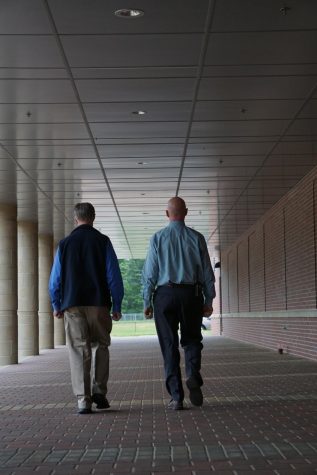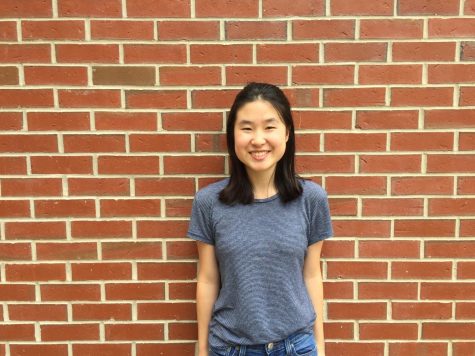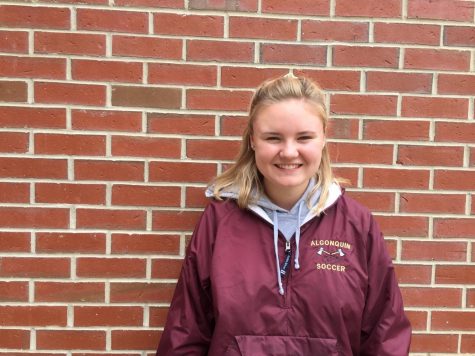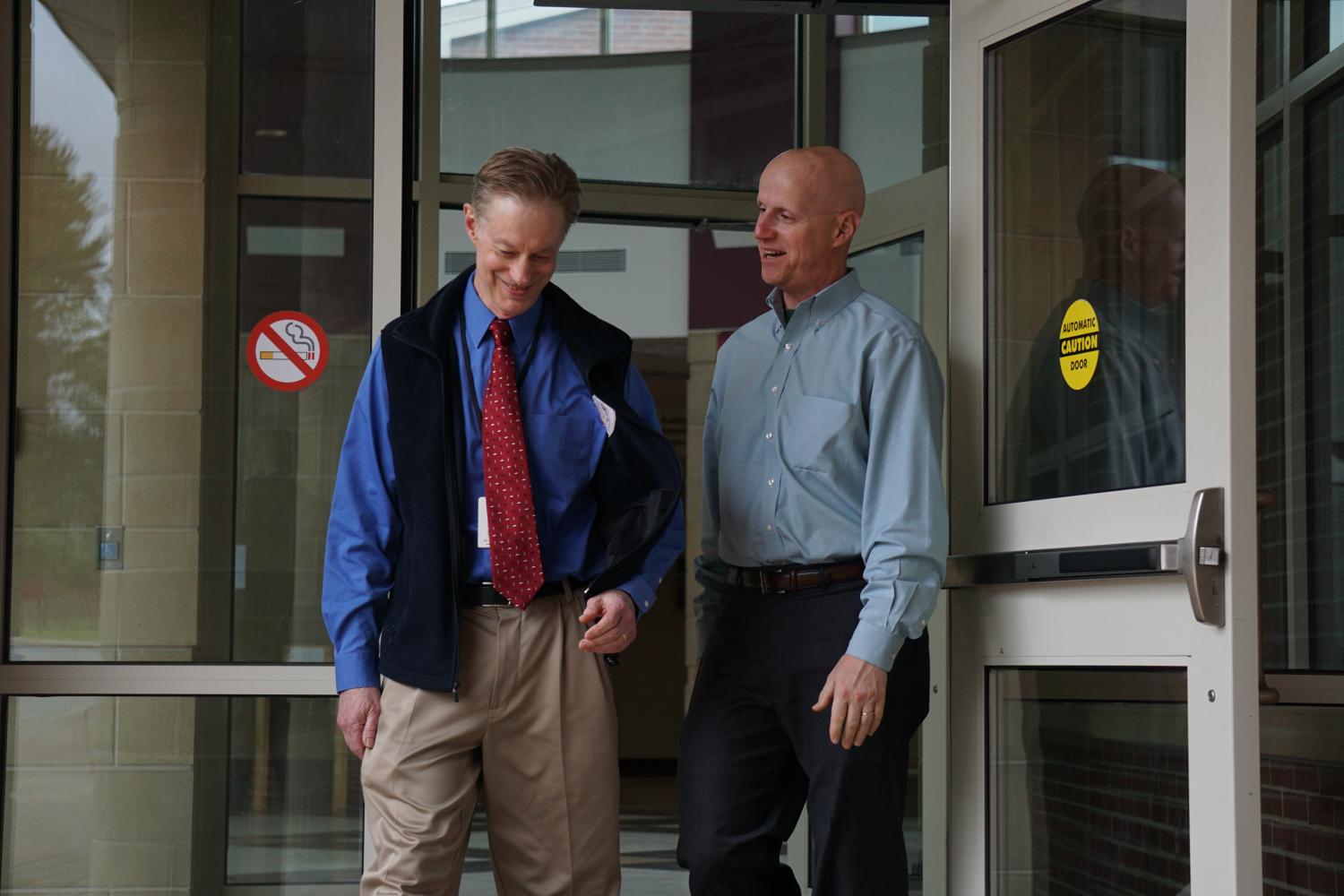Three administration members leave
Administrative openings create windows for change
Principal Tom Mead and Assistant Principal Paul DiDomenico will both be leaving Algonquin after the school year closes.
Graduation caps and summer breeze fill the air, but the resignation and retirement of three administrators
has introduced something new for faculty, students and the greater community: uncertainty and change.
Along with Principal Thomas Mead and Assistant Principal Mel Laughton’s retirement announcements, Assistant Principal Paul DiDomenico recently resigned from his role to take a principal position in another district. With only one remaining assistant principal from the four-person team, a new administration is emerging, leaving the future of Algonquin in new hands.
DiDomenico Resigns
After 12 years as an assistant principal, DiDomenico has accepted the position of principal at Nashoba Regional High School in Bolton.
“It’s going to be very exciting to lead my own school,” DiDomenico said. “They have a wonderful faculty and I’m told there’s a really healthy culture there, so I’m looking forward to it.”
According to DiDomenico, he will miss many aspects of Algonquin including the student culture and the quality of academics.
“When I think about the school in general, I think about the humor, the spirit and the generosity of the student body and the fact that there are some really terrific teachers here who have high expectations but they’re willing to work with kids to meet those expectations,” DiDomenico said.
DiDomenico has been involved in planning events and attending to students’ needs during his years at Algonquin.
“I’ve done everything from working with freshman teams to planning MCAS to planning freshman orientations,” DiDomenico said. “Now I’m involved with creating the master schedule for next year. Of course you’re always putting out fires that come up or addressing needs as they come up.”
DiDomenico has found one aspect of his role as assistant principal to be particularly rewarding: helping struggling individuals and their families.

“One thing that I’ve always appreciated about the assistant principal’s position is that you often deal with people who are in a crisis on some level- a crisis in their family, a crisis in their school life,” DiDomenico said. “It’s very gratifying to give service to someone when they’re in that position.”
DiDomenico believes that despite a new administration taking shape, the spirit and happiness throughout the school will not change.
“At 1:58 the buses roll, kids are all gone, and there’s always a group of kids still out in [H200] hall,” DiDomenico said. “That’s a nice sign, that the kids genuinely enjoy being here, and that joy will remain.”
Role of Administration
With the selection of a new principal underway, Mead believes that the role of the principal, with the help of faculty and students, holds great power to make change in the school community.
“[I get inspiration to make change] from two sources,” Mead said. “One is me, but the more important one is that it comes from other people, from having a door open to students and teachers, [allowing them] to come in and talk about things they’re interested in doing or suggestions that they have for making things better… As a school we move forward always if we have more voices and more input to our discourse.”
According to Mead, ideas for new courses and electives were usually brought to his attention by teachers with hopes to improve the academic selection.
“Those are homegrown, most of those elective courses,” Mead said. “Those are the idea and the inspiration of those teachers that are teaching them. I think that’s fantastic because that’s a perfect marriage, if you will, of passion and instruction.”
During his time as principal Mead has made other changes, including his role in initiating the termination of reporting class rank to students. However, Mead wishes he was able to further develop his ideas about pushing the school start time.
“I have ideas about it, but my time is about up, and that is to move the starting time of school,” Mead said. “It should be 8:30, not 7:20. That way, it’s better for teenagers in their phases of development; we know that.”
At the same time, Mead placed limitations on his role as principal and his ability to change and control various aspects of the school. He did not want to control the content of The Harbinger and Sachem magazine, referring to their freedom as something “to be celebrated but also guarded by the school.”
“I don’t want to control [student press],” Mead said. “I don’t want to do that. Part of my job is getting out of the way. I’m fine with people taking some calculated risks or putting something out that is perhaps controversial. I don’t proofread things; that’s not my role.”
Mead values the importance of allowing the community to actively participate in decision making.
“Part of my job is to get out of the way,” Mead said. “Part of my job is to not impede progress. That would be the worst thing I could do.”
According to Mead’s secretary Michelle Capalbo, Mead values his personal connections with every student at the school.
“Not only does he know the students, he knows what sports they play, whether they’re in the music [department], whether they’re part of the Harbinger,” Capalbo said. “He’s phenomenal like that and I will miss that because he’s just a calming presence in this office and always available to go to if you need something.”
Additionally, Mead believes that when the administration gives teachers and students the freedom to experiment with new ideas, positive changes are manifested.
“I have to think, ‘What’s the value of giving people some leeway, some freedom, a chance to test something out?’” Mead said. “There’s a lot of good that comes out of that. The primary purpose of that is to send a signal to the organization that ideas count, suggestions matter, change is inevitable, so let’s think about how we can change things for the better.”
The New Administration
According to DiDomenico, just like previous ones, the new administration will be working extensively in August before school resumes in the fall.
“For school administrators everywhere, August is the most stressful month of the year because while the building is empty, you know it won’t be empty come the end of the month,” DiDomenico said. “We are right now doing everything we can in terms of the master schedule and laying things out to make the transition of power as smooth as possible.”
Mead believes the recipe for administrative success lies in the entire team’s willingness to work productively.
“Discipline helps a team work well,” Mead said. “If you meet, and we meet on a regular basis, then you should have enough structure for those meetings so that they are productive… One thing I did when I came here was that I thought that there should be a little bit more accountability. I have invited for eight years every week my administrative assistant to come with me to the meeting of the department chairs and take notes. We put those notes out within a day, sometimes within that day, to everybody who was there at the meeting. That’s accountability.”
As for the future of Algonquin, Mead believes that the atmosphere of the school will remain regardless of the new administration forming and is confident in the faculty and students’ capabilities.
“It’s the great unknown, but I have a lot of confidence in the students and the staff that are here that will continue on next year,” Mead said. “The students and the staff here, collectively, are genius. If they remember that and think about that and work together, I think they can help the new administration to learn about Algonquin, to learn about its incredible strengths and great programs that it has.”
“[I hope the new administration can] assume the leadership with good intentions, good patience and good listening,” Mead said. “Listening is so important when you start out because you have to learn about the organization.”
Capalbo also hopes that the new administration is as open to hearing ideas as the current administration is.
“I think the next principal will probably change things depending on how they perceive the school to be,” Capalbo said. “I would hope that they would be open-minded and [have an] open door policy, and really listen to what the students and faculty have to say. I’m sure the next person will be that without a doubt, but they’re big shoes to fill.”
A donation of $40 or more includes a subscription to the 2025-26 print issues of The Harbinger. We will mail a copy of our fall, winter, spring and graduation issues to the recipient of your choice. Your donation supports the student journalists of Algonquin Regional High School and allows our extracurricular publication to purchase equipment and cover our annual website hosting costs.

Cassidy Wang has pursued journalism since her freshman year. As A&E editor her sophomore year, she reported on theatre productions. As news editor,...

Paige Morse began writing for the Harbinger during her freshman year. She has written many A&E pieces, but dabbles in sports, news and opinion. Outside...




